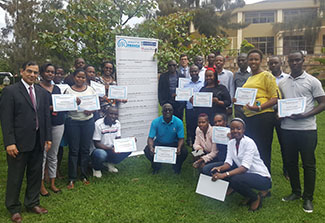Diaspora influence on research in sub-Saharan Africa
March/ April 2022 | Volume 21 Number 2
 Courtesy of Dr. Adebola Adedimeji Researchers from the University of Rwanda at a research administration and grants management workshop in Kigali.
Courtesy of Dr. Adebola Adedimeji Researchers from the University of Rwanda at a research administration and grants management workshop in Kigali.
The Fogarty-funded project focuses on enhancing HIV research training capacity.
The migration of experienced scientists and medical professionals from sub-Saharan Africa since the 1980s has led to gaps in education and research capacity. In 2022, the pace of migration has slowed; in fact, researchers in sub-Saharan Africa have more than doubled their research production since 2002.
A contributing factor to this growth has been the influence of diaspora scientists. Dr. Olugbenga Ogedegbe is the Chief of the Division of Health & Behavior and Director of the Center for Healthful Behavior Change in the Department of Population Health at New York University's School of Medicine. He is also a member of Fogarty's advisory board. He says, "Looking at the data between 2002 to 2012, 79% of the research coming out Africa is led by the U.S. and the majority of those driving that work are diaspora scientists."
Diaspora scientists bring a unique perspective to the U.S. institutions they work in, connecting with colleagues and potential study participants in their country of origin more quickly and with more understanding than other scientists. Dr. Fred Ssewamala, professor and associate dean at Washington University, says, "One of the biggest added benefits an African scientist brings is lived experience. Being from Uganda and doing most of my work there, I understand the environment, and I can pose relevant questions and apply methodologies that work for the communities we engage with."
This background gives diaspora scientists the ability to mentor up-and-coming researchers in their countries of origin. "Many researchers seek guidance from diaspora scientists on becoming a productive scientist despite being from a lower-income country," said Ssewamala. "Having diaspora scientists in leadership positions is important because it shows these scientists it is within their reach."
However, scientists who left a lower-income country to study and work in the U.S. or other high-income countries find the balance between “brain drain" and “brain circulation"—or the collaboration of diaspora scientists with those in their country of origin—challenging. They know that while their careers benefited from relocating, the research capacity in their home country may have suffered.
With this in mind, many diaspora scientists in global health work on projects intended to give back and build research capacity within their country or region of origin. Dr. Adebola Adedimeji, Division Head and Research Associate Professor at Albert Einstein College's Department of Epidemiology & Population Health, is currently a principal investigator on a Fogarty-funded project in Rwanda focused on enhancing HIV research training capacity. "Being in the U.S. has allowed me to tap into the available expertise and resources to advance our research in sub-Saharan Africa."
Dr. Ogedegbe has been the principal investigator since 2018 on a Fogarty-funded project that aims to strengthen research ethics capacity in Ghana by offering a Master's degree in bioethics from NYU to 24 fellows in Ghana and developing a sustainable bioethics program at the University of Ghana.
Dr. Ssewamala is a co-principal investigator on several NIH-funded training programs that focus on training early-career researchers committed to careers in child behavioral health. Including the Fogarty Global Fellows and Scholars program at Washington University, now called LAUNCH, which fosters the next generation of global health scientists by providing training at established biomedical and behavioral research institutions and project sites across sub-Saharan Africa.
Projects like these are just the beginning of what many hope to see for the future in decolonizing global health. Other methods have included adapting curriculums to fit the country's context and funding projects that allow for training in-country. "We cannot rely on a one-size-fits-all strategy for capacity building," said Adedimeji. With life expectancy in sub-Saharan Africa still much lower than that of the rest of the world, mainly due to the burden of chronic disease, building this base of scientists and researchers is critical. "Fogarty's continued support for capacity building initiatives across sub-Saharan Africa has been extremely valuable, but we still have a lot of ground to cover."
More Information
Updated April 19, 2022
To view Adobe PDF files,
download current, free accessible plug-ins from Adobe's website.
Related World Regions / Countries